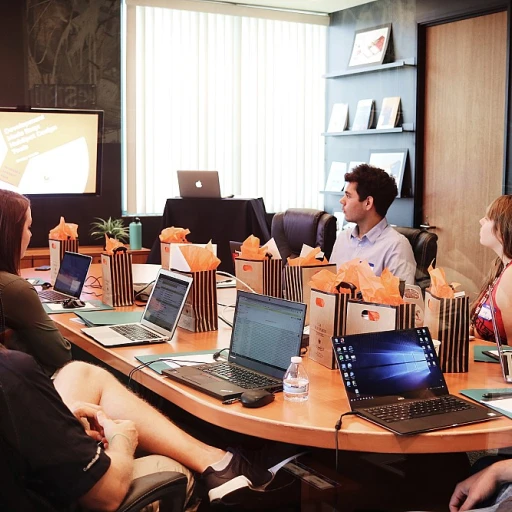Understanding the Role of Professional Mentoring
The Core Essence of Professional Mentoring
Understanding the role of professional mentoring is crucial for both mentors and mentees. Essentially, mentoring serves as a vital mechanism in career development, facilitating personal and professional growth. Whether you're an early career student finishing college or an experienced employee, guidance from a qualified mentor can provide invaluable insight and support in various job-related decisions.
Professional mentoring is often seen as an exchange where experienced individuals share their knowledge, skills, and experiences with those at different stages of their careers, such as students or individuals transitioning to a new job or industry. This exchange not only aids mentees but also enriches mentors, driving their leadership and interpersonal abilities. For instance, an executive director or a director of workforce development might offer a unique perspective on career progression and job search strategies.
Mentors are drawn from various sectors, including career services, university settings, and professional development programs. They hold various roles such as director career, career advisor, or even assistant director, all bringing diverse insights to career growth. Whether in a bustling metropolis like San Francisco, San Diego, or San Jose, or in state programs dedicated to enhancing workforce development, mentoring plays a pivotal role in career success.
Navigating the challenges and maximizing the benefits requires understanding the dynamics of these relationships. Developing effective mentoring relationships is crucial to reaping its advantages. As mentoring is adapted across different career stages, its impact is multiplied, equipping individuals with the tools needed for each stage of their professional journey.
For those interested in learning more about effective career counseling approaches, exploring
motivational interviewing techniques can offer additional valuable strategies.
Benefits of Mentoring in Career Development
Unlocking Potential: How Mentoring Accelerates Career Progress
Mentoring is more than just guidance for completing day-to-day tasks. It's a powerful catalyst for
career development, particularly in nurturing an individual's leadership skills and professional growth. This relationship often holds the key to unlocking a mentee’s potential.
- Skill Development: Mentors provide insights into the skills needed for growth in specific jobs, from entry-level positions in San Francisco to senior management roles in San Diego. Understanding these skills can significantly reduce the time required to progress from being a student to becoming an executive director or manager.
- Network Expansion: By leveraging their professional connections, mentors can expand a mentee’s network, which is crucial in highly competitive fields. This is often facilitated by career services or centers, allowing individuals to connect with potential employers in places like San Jose and beyond.
- Confidence Building: With their guidance, mentors can assist mentees in mastering the soft skills necessary for career advancement. This includes overcoming challenges associated with role confusion and understanding workplace cultures.
- Goal Setting and Achievement: Mentors help mentees define and refine their career aspirations. By setting clear goals and creating actionable plans, mentees are more likely to seek out opportunities, be it a new role as an assistant director or transitioning into workforce development roles.
- Lifelong Learning: The dynamic nature of today's labor market makes it crucial for professionals to engage in continuous learning. Be it through a university program, professional development workshops, or practical experiences, mentors can guide on the most effective paths for educational growth, ensuring a seamless transition through different career stages.
A successful mentoring relationship heavily contributes to positive job outcomes, highlighting the profound impact a mentor can have on an individual's career trajectory. Whether in college, post-graduation, or during a career transition, mentoring plays an irreplaceable role in shaping one's professional future.
Challenges in Professional Mentoring
Overcoming Hurdles in Professional Mentoring
Navigating the path of career development through professional mentoring, while immensely beneficial, is not without its challenges. These hurdles often stem from both structural and relational aspects of the mentoring process, affecting students, employees, and even managers in various career stages.
One prominent challenge is the mismatch between mentors and mentees. This can occur when the professional development goals of the mentee do not align with the expertise or experiences of the mentor. For instance, a student embarking on their career journey after college or university may seek guidance differently than an executive director looking to refine leadership skills in the corporate sphere.
Furthermore, time constraints can heavily impact the mentoring experience, particularly for those working full-time or have responsibilities in student affairs or director workforce positions. Scheduling conflicts between a busy career advisor and a mentee’s demanding job schedule can result in ineffective communication or missed opportunities for growth.
Maintaining motivation and engagement throughout the mentoring relationship can also be challenging, especially when navigating early career stages or when transitioning jobs. Associate directors or directors of workforce development might experience this as they attempt to juggle multiple projects, such as managing services at a career center or implementing a new program.
Cultural and organizational differences between mentors and mentees can introduce additional barriers. For example, individuals located in diverse areas like San Jose or San Diego may have different workplace cultures that influence mentoring interactions.
Adapting to these challenges requires a proactive approach to ensure a fruitful mentoring relationship. Exploring resources focused on an abundance mindset could enhance the mentor-mentee dynamic. For further insights, consider exploring the
best books on developing an abundance mindset.
Ultimately, understanding and addressing these challenges is crucial for creating productive and lasting mentoring partnerships in any career stage, from student affairs to executive roles. By confronting these hurdles, both mentors and mentees can craft a more meaningful and impactful career development journey.
Strategies for Effective Mentoring Relationships
Building Successful Mentoring Connections
Creating a fruitful mentoring relationship is a key element on the path to effective career development. Both mentors and mentees have roles to play in nurturing this connection. Let's explore some strategies to enhance the mentoring dynamic.
- Define Clear Expectations: Right from the outset, both parties need to articulate their expectations. Whether it's specific career goals, industry insights, or achieving a work-life balance, clarity is essential for progress. This helps prevent misunderstandings and aligns the mentoring process with the mentee’s career aspirations.
- Prioritize Open Communication: Frequent and honest communication lays the foundation for a robust mentoring relationship. Encourage a space where feedback is constructive and timely, aiding in the mentee’s professional and personal growth. Regular touchpoints can be beneficial, whether you're utilizing technology to connect remotely or meeting in person.
- Leverage Diverse Perspectives: Mentors should integrate different viewpoints to offer mentees a comprehensive understanding of their career paths. Exposing mentees to new ideas and challenging assumptions contributes significantly to their career development.
- Utilize Existing Resources: Career services centers and programs at universities or career centers in cities like San Francisco, San Diego, or San Jose offer numerous resources. Mentors and mentees should take advantage of these, alongside tools such as webinars, workshops, or career advisory services, to enhance the mentoring experience.
- Customize the Mentoring Experience: One size doesn't fit all in professional mentoring. Tailor sessions to the mentee’s stage in their career journey. Whether they're an early-career professional, a university student, or an executive director, personalized guidance will maximize impact.
- Set Measurable Milestones: Establishing clear, attainable goals can facilitate the tracking of progress. Breaking down larger career objectives into smaller milestones helps maintain motivation and provides a clear framework for success.
- Incorporate Feedback Loops: Continuous improvement is vital. By integrating feedback loops, both mentors and mentees can evaluate and enhance their mentoring relationship over time, optimizing for better outcomes.
Ultimately, a successful mentoring partnership is built on mutual respect, trust, and commitment. By adopting these strategies, mentors and mentees can significantly advance their careers and personal development, fostering a culture of continuous learning and growth in today’s dynamic job landscape.
Mentoring Across Different Career Stages
Mentoring for Different Career Stages: A Tailored Approach
Navigating through the various stages of a career can be a complex journey, and professional mentoring plays a crucial role in providing guidance tailored to each stage. Whether you're a student, an early-career professional, or an executive director, the mentoring needs and strategies differ significantly.
Early Career Mentoring: Building Foundations
For students transitioning from college or university into the workforce, mentoring focuses on building the foundational skills necessary for career development. At this stage, career advisors and mentors often emphasize the importance of networking, resume building, and job search strategies. In places like San Francisco, where competition is fierce, having a mentor can make a significant difference in securing that first full-time job.
- Focus Areas: Resume writing, interview preparation, networking
- Key Players: Career centers, student affairs professionals, career advisors
Mid-Career Mentoring: Navigating Growth
As professionals progress in their jobs, the mentoring focus shifts towards career advancement and leadership development. This stage often involves more strategic planning and skill enhancement, with mentors guiding mentees on how to take on more responsibilities and prepare for managerial roles. For those in San Jose or San Diego, where tech jobs are prevalent, staying updated with industry trends is crucial.
- Focus Areas: Leadership skills, strategic career planning, industry trends
- Key Players: Associate directors, managers, workforce development specialists
Executive Mentoring: Refining Leadership
For senior leaders and directors, mentoring is about refining leadership qualities and navigating complex organizational dynamics. At this level, mentoring often involves peer-to-peer interactions or executive coaching, focusing on strategic decision-making and enhancing people culture within organizations.
- Focus Areas: Strategic leadership, organizational dynamics, executive coaching
- Key Players: Executive directors, directors of workforce development, assistant directors
Each career stage presents unique challenges and opportunities, making the role of a mentor invaluable in providing personalized guidance. Whether you are just starting out or are a seasoned professional, leveraging the right mentoring strategies can significantly enhance your career trajectory.
Leveraging Technology in Mentoring
Enhancing Mentorship with Modern Technology
The world of professional mentoring, like many other aspects of career growth, has been significantly transformed by technology. Integrating innovative tech solutions not only makes mentoring more accessible but also provides tools for a more tailored and effective experience.
As an executive director or a manager looking to boost the effectiveness of mentorship programs, leveraging technology can open new avenues for career development. Here’s how technology is playing a pivotal role in modern professional mentoring:
- Virtual Mentoring Platforms: Technology has brought about a shift from in-person interactions to online platforms. This shift makes it possible for students, a full time employee, and even the director of career services to connect seamlessly regardless of their location, whether they're in San Francisco, San Jose, or San Diego. Digital platforms can facilitate meetings, track progress, and provide feedback, enhancing the mentor-mentee relationship.
- Personalized Learning and Development: Many mentoring solutions now integrate AI to create customized learning paths. This is especially beneficial for those in early career stages or transitioning between jobs. Personalized career services delivered through technology offer tailored guidance, making it easier to align professional goals with available opportunities.
- Data-driven Insights: Advanced analytics tools help mentors and mentees to analyze career development trends and outcomes. Career advisors and directors can utilize these insights to refine mentoring strategies, ensuring a more targeted approach to skills development and job readiness.
- Networking Opportunities: The power of technology extends to building professional networks. From virtual career fairs hosted by universities to global mentorship or leadership forums, technology bridges the gap between students and industry leaders, facilitating meaningful connections.
For career centers and workforce development departments, embracing technology in mentoring services is not just an option but a necessity. By effectively utilizing digital tools, mentorship programs can better cater to the evolving needs of a diverse workforce, driving career growth and professional advancement across different job roles and industries.














